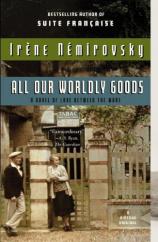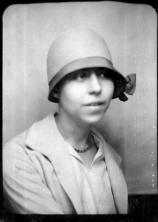ALL OUR WORLDLY GOODS is the posthumous publication of a great European writer who died at Auschwitz in 1942. Most of Irene Nέmirovsky’s publications are in French, though several have garnered enough attention to be translated into other languages. She was originally a Russian native, fleeing that country in the early 1900s during the Revolution. She and her family settled in Paris, where she spent most of her life, though was denied citizenship by the French government. She became world famous after her death at the age of 39. Understanding these details seems fundamental to appreciating the importance of this book, her masterpiece.
"ALL OUR WORLDLY GOODS is the masterpiece of a clever novelist who clearly knew her countrymen well and personally experienced the history she wrote about."
Within the first few pages of ALL OUR WORLDLY GOODS, readers will recognize a world-class read. This evocative novel is extraordinary literature, seeming nothing like the usual violent war story of the modern age. It is a quiet, charming, subtle tale of a world long past. The setting is France in the year 1910, spanning the next 30 years, and the entire story takes place within two different locales, most scenery lying within the boundaries of a small town called Saint-Elme near the Southern coast of France. The trail bends at intervals toward Paris and shows vivid scenery of the great city.
This is a different France than readers might be expecting, a place where social class was everything and social stratification was the natural law. At this time, traditions ruled, gossip was binding and important, and old values were not questioned. Arranged marriages still occurred frequently, and the subject of this book is one particular arranged marriage where a man and a woman ---- each from traditional, well-to-do families --- are promised to one another but secretly feel little mutual love. Their parents seem to realize this but expect them to marry anyway, as does the whole town. The groom-to-be, Pierre Hardelot, is deeply in love with someone else, a woman of such drastically different social class that she could never be considered as a legitimate love interest. Pierre’s interest in Agnes provokes a scandal in his hometown that spreads through all the gossip chains and leaves them ruined. But Pierre and his lady love eventually do find the courage to rock the boat anyway and stir up the hate of all the petty villagers.
This is the story of lovers and their defiance for the bourgeoisie class. In the France of the early 1900s, this type of defiance was nearly unheard of. ALL OUR WORLDLY GOODS is about the many perceptions of the villagers of Saint-Elme, spanning the entire natural course of Pierre’s adult lifetime as his country ages right along with him, taking Pierre through the many stages of human life as he fights and experiences the changes within France over 30 years.
The culture of Nέmirovsky’s France fills her book with an oddly captivating charm and a provincial atmosphere. In this writer’s capable hands, all the French villagers come to life and become individuals with clear motives and dreams. One of Nέmirovsky’s many gifts seems to be creating full, vivid depictions of people and local events. The townspeople she writes about are subtle, elegant, selfish, wholly human creatures whose motives drive society, turn the tides, and eventually make history.
ALL OUR WORLDLY GOODS seems as much a tale about economics and human psychology as it is a story of war. This war story, however, as tangential as it might seem, is very vivid and emotional. Readers are not likely to ever forget the story within the pages of this amazing and significant book. ALL OUR WORLDLY GOODS is the masterpiece of a clever novelist who clearly knew her countrymen well and personally experienced the history she wrote about.




